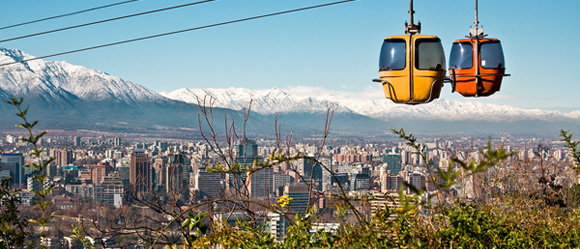Santiago, Chile
Last updated on Apr 22, 2023
Summary: People describe Santiago, Chile as a vibrant, modern city with a rich cultural heritage. Expats love the city's diverse neighborhoods, its excellent public transportation system, and its proximity to the Andes Mountains. The weather in Santiago is generally mild, with temperatures ranging from the mid-50s to the mid-80s Fahrenheit. The average cost of living for an expat is estimated to be around $1,500 to $2,000 per month. The cost of a one bedroom apartment in Santiago is around $500 to $700 per month, while a two bedroom apartment can cost anywhere from $700 to $1,000 per month. The approximate population of Santiago is 6.5 million people.

What do I need to know about living in Santiago?
When we asked people what advice they would give someone preparing to move to Santiago, they said:
"Before retiring in Santiago, expats should familiarize themselves with the local culture and language. It is also important to research the cost of living in Santiago, as well as the availability of healthcare and other services. Additionally, expats should consider the climate and the type of housing they will need. Finally, it is important to understand the visa and residency requirements for living in Chile," said one expat in Santiago.
"I would tell a friend looking to move here to learn a little Spanish first, don't bring everything you own with you because you can find all you need here and prepare to have a wonderful, new cultural experience because Chile is an interesting and beautiful place to live," said one expat who made the move to Santiago.
 William Russell
William RussellGet Quote
William Russell's private medical insurance will cover you and your family wherever you may be. Whether you need primary care or complex surgery, you'll have access to the best hospitals & doctors available. Unlike some insurers, we also include medical evacuation and mental health cover in our plans (except SilverLite). Get a quote from our partner, William Russell.
 William Russell
William RussellWilliam Russell's private medical insurance will cover you and your family wherever you may be. Whether you need primary care or complex surgery, you'll have access to the best hospitals & doctors available. Unlike some insurers, we also include medical evacuation and mental health cover in our plans (except SilverLite). Get a quote from our partner, William Russell.
Get Quote
What do I need to know before moving to Santiago?
Please login to continue reading this article.
Not a member? Join Today (it's free).
About the Author
 Betsy Burlingame is the Founder and President of Expat Exchange and is one of the Founders of Digital Nomad Exchange. She launched Expat Exchange in 1997 as her Master's thesis project at NYU. Prior to Expat Exchange, Betsy worked at AT&T in International
and Mass Market Marketing. She graduated from Ohio Wesleyan University
with a BA in International Business and German.
Betsy Burlingame is the Founder and President of Expat Exchange and is one of the Founders of Digital Nomad Exchange. She launched Expat Exchange in 1997 as her Master's thesis project at NYU. Prior to Expat Exchange, Betsy worked at AT&T in International
and Mass Market Marketing. She graduated from Ohio Wesleyan University
with a BA in International Business and German.
Some of Betsy's articles include 12 Best Places to Live in Portugal, 7 Best Places to Live in Panama and 12 Things to Know Before Moving to the Dominican Republic. Betsy loves to travel and spend time with her family. Connect with Betsy on LinkedIn.
Other Questions:
- What do I need to know before moving to Santiago?
- What is a typical expat home or apartment like in Santiago?
- What is the average cost of housing in Santiago?
- How do I meet people in Santiago?
- What do I need to know before retiring in Santiago?
- What should I pack when moving to Santiago?
- Where should I setup a bank account in Santiago?
- Will I be able to find a job in Santiago?
- What is life like as an expat in your area?
- What do people like (and dislike) about Santiago?
- What type of social life can someone expect in Santiago?
- What is the social scene like in Santiago?
- What advice to expats in Santiago have about housing?
- What are medical services in Santiago like?
- Are healthcare and health insurance expensive in Santiago?
- Is the cost of living in Santiago high?
- What are the visa & residency requirements in Santiago?
- Why do people move to Santiago?

 Santiago, Chile
Santiago, Chile
